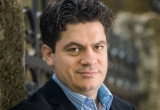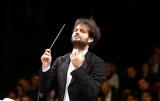Wie kam es zur aktuellen CD-Produktion und dem besonderen thematischen Fokus auf Streichquartette von Opernkomponisten?
Wir wollten unbedingt Verdis Streichquartett aufnehmen. Es wird eher selten gespielt, ist aber ein ganz besonderes Werk. Parallel dazu hatten wir schon lange vor, Mozart aufzunehmen. In seiner Kammermusik erleben wir ihn wirklich als großen Opernkomponisten – in jedem Satz spürt man die szenische Darstellung. Read More →
What does this award mean to you and how do you feel about receiving it?
I am, above all, very happy for the opportunity to produce this album with Enescu’s music. This is music I have loved all my life and I have always wanted to bring it into a brighter spotlight by recording the three symphonies and the two rhapsodies. These recordings are just the beginning, so to speak, of my broader vision for showcasing Enescu’s music. I am delighted that these efforts continue to garner such attention. For me, this award is a recognition of not just our hard work, but also the incredible quality of Enescu’s compositions, which fills me with great joy. Read More →
Samuel Hasselhorn and the Poznań Philharmonic Orchestra. Jakub Puchalski from the ICMA Jury member Polskie Radio Chopin made the following interview with him.
Seeing your many CDs, one can trace an idea behind them. A discovery or rediscovery of interesting, beautiful repertoire, often once well-known but later forgotten. The same one can say about your concert programs. You must be extremely hungry for new music.
My interest in unknown music started very early. Since the childhood, once I started to collect CDs. It was at elementary school in my early years. And after getting to know the standard repertoire, I started my own research to discover new composers, new pieces, new performers. And somehow it went naturally, because when I started my conducting career, I was often assisting to many important productions at the Polish orchestras. First of all, at the Warsaw Philharmonic Orchestra where I was assistant to Antoni Wit, who was recording a lot of Polish music and he was promoting an unknown music, as well as the orchestra, as well the places I assisted too, at the Budapest Festival Orchestra, also at Teatr Wielki. Read More →
In several interviews, you have said that you are not overly concerned about the prizes, but rather look to the future. What motivates you?
I’m certainly happy to be recognized for my work, but it’s very foreign to me to give my mind a rest or to settle down. I often find myself listening to my older recordings and just getting angry with myself that I should have done certain things differently, but once I let go of them, I can’t change them. In the 80s and 90s I recorded all the Haydn symphonies, and when I listen to them I get the same feeling. Read More →
In mehreren Interviews haben Sie gesagt, dass Sie sich nicht allzu sehr um die Preise kümmern, sondern eher in die Zukunft blicken. Was motiviert Sie?
Ich freue mich natürlich über die Anerkennung meiner Arbeit, aber es ist mir sehr fremd, meinen Geist zur Ruhe kommen zu lassen oder zur Ruhe zu kommen. Ich ertappe mich oft dabei, dass ich mir meine älteren Aufnahmen anhöre und mich über mich selbst ärgere, dass ich bestimmte Dinge anders hätte machen sollen, aber wenn ich sie einmal losgelassen habe, kann ich sie nicht mehr ändern. In den 80er und 90er Jahren habe ich alle Haydn-Sinfonien aufgenommen, und wenn ich sie anhöre, habe ich das gleiche Gefühl. Read More →
Firmly rooted in Western musical culture, she has always maintained a link with the musical tradition of her country of origin, also drawing inspiration from other musical latitudes and from extra-musical artistic and cultural universes.
Your writing happens on paper, giving up the possibility offered by the computer to edit your scores, which are clean but at the same time creative, works of art in themselves. Is your writing always linear, without second thoughts?
I always compose at my desk, without a computer or a keyboard. I never play the notes I write on the staff. I was brought up this way: it’s my habit and it’s the only way I can compose. Creating a piece is a job where I have to make many decisions on many different levels, including the entire context, focusing less on the sound of each individual note. This process takes a lot of time, also because I make sketches first. And, of course, it’s always possible that I’ll have relapses or second thoughts, or that I’ll throw away some material and start over again. Read More →
Planet Earth – as within so without – ein ungewöhnlicher Titel für eine CD mit klassischen Klavierwerken. Sie wollen mit dem Titel und der Stückauswahl einen künstlerischen Anstoß geben und einen Herzenswunsch zum Ausdruck bringen. Worum geht es Ihnen?
Ich mag ausdrucksstarke und ungewöhnliche Titel, die Neugier wecken und das Potenzial haben, Menschen mit unterschiedlichstem Hintergrund anzusprechen. Für mich bleibt klassische Musik zeitlos und damit immer modern und relevant – auch das schwingt im Titel Planet Earth – As Within, So Without mit. Read More →
Was war deine erste Komposition?
Mein Opus 1 war Amores, Ovids Liebesgedichte für Streichquartett und Stimme. Die Uraufführung 2005 habe ich selbst gesungen und spontan improvisiert und meine eigenen Bühnenbilder gemalt. Meine Mutter ist damals an einem Lichthebel gesessen und wir haben das sozusagen voll szenisch aufgeführt. Die Leute waren begeistert. Ein erster Versuch und gleich ein Kick mitten hinein in die Welt des Schöpfens und der Kreation! Read More →
Die Werke auf Ihrer CD waren eigentlich für die Traversflöte geschrieben. Sie treten den beeindruckenden Beweis an, dass die Blockflöte der Travers- bzw. Querflöte in nichts nachsteht. Was hat Sie dazu veranlasst, die Konzerte auf der Blockflöte zu spielen?
Auf meiner Suche nach einer neuen Herausforderung war relativ schnell klar, dass ich mich mit dem neuen Album an Flötenkonzerte aus der Frühklassik wagen möchte. Im Vordergrund stand dabei die Überzeugung, dass die ursprünglich für die Traversflöte konzipierten Werke auf der Blockflöte besser klingen, da wir heute in der Lage sind Blockflöten zu bauen, die ihren ursprünglichen kernigen und warmen Klang beibehalten, jedoch an voluminöser Strahlkraft dazu gewonnen haben. Read More →
Arthur Stockel, Sie wurden bereits mit 21 Jahren Soloklarinettist beim Luxembourg Philharmonic. Wie sind Sie denn eigentlich hier gelandet?
(lacht) Ich kam eigentlich eher durch Zufall zum Luxembourg Philharmonic. Ich hatte bis dahin die Position des Bass-Klarinettisten beim London Symphony Orchestra inne, wo ich auch das Vorspielen gewonnen hatte und wo ich mich auch sehr wohl fühlte. Ich hatte somit das große Glück, meine ersten Sporen als Orchestermusiker beim LSO verdienen zu können. Kurz darauf aber wurde der Posten des Soloklarinettisten beim Luxembourg Philharmonic ausgeschrieben und das interessierte mich natürlich sehr. Read More →




























